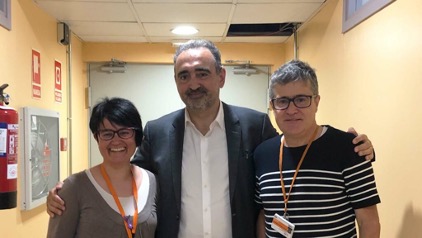A new joint work by the Hospital del Mar Research Institute, Vall d’Hebron Institute of Oncology (VHIO), IDIBELL and the Catalan Institute of Oncology, with researchers from the CIBER del Cancer (CIBERONC), opens the door to a new way to avoid tumor proliferation. It involves combining different existing treatments to attack cancer cells in three ways and stop their progression. The study is published in the EMBO Journal.
Researchers have focused on the role of a specific protein, IKKα, which is known to act on other proteins to allow tumor cells to multiply and escape the action of treatments. Targeting this protein is not currently feasible, since general IKKα inhibitors can cause a lot of toxicity to patients. Therefore, researchers have looked for other ways to act and have been able to study how IKKα regulates two pathways related to tumor proliferation and resistance to chemotherapy.
“In tumors, IKKα is capable of regulating and activating different pathways linked to tumor proliferation and survival; consequently, identifying these pathways is essential to design new therapeutic targets for the treatment of cancer patients,” explains Dr. Lluís Espinosa, from the Hospital del Mar Research Institute and coordinator of the work. The pathways identified in this work involve the BRD4 protein and the JAK/STAT signaling pathway and there are drugs that can inhibit their activity. The research teams of Dr. Joan Seoane, from VHIO, and Dr. Alberto Villanueva, from the Catalan Institute of Oncology and IDIBELL, have also collaborated in carrying out this work, contributing their experience in carrying out different experimental approaches.
New IKKα features
Until now, there were no clues about the ability of IKKα to act on tumors through both pathways. By activating them, cancer cells are able to proliferate, and, in turn, cell death induced by chemotherapy treatments is inhibited. Inhibition of both pathways enhances tumor cell death in response to chemotherapy. This role has been verified both in animal models and in organoids generated from cells from patients with colon and rectal cancer, although the conclusions can be extended to other tumors with these mechanisms activated. It has been confirmed that “in tumors that present combined activation of the two pathways by IKKα, inhibiting them together with chemotherapy is much more effective than individual treatments,” the researchers add.
This may allow combinations of treatments to be selected that act together with chemotherapy to stop the cancer. At the same time, using more than one drug also makes it easier to reduce the doses and toxicity of the treatments. For this reason, performing screening to identify tumors with these activated mechanisms could allow the identification of patients who are candidates for new therapeutic approaches. Researchers have also been able to identify the levels of both IKKα and another protein, leukemia inhibitory factor (LIF), as a prognostic marker for patients with colon and rectal cancer.

